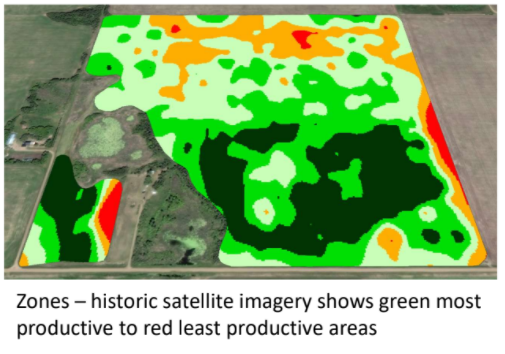[December 2021]
Key Points
• On-farm trials reveal losses from chemical use
• Seed Terminator helps to stop the spread of weed patches
• Plans to fit two more Seed Terminators to combines

On-farm trials in Canada are demonstrating the benefits of the Seed Terminator for broad spectrum weed control and slowing the onset of herbicide resistance in cropping operations.
Josh Lade has been farming at Osler, Saskatchewan, for 10 years after migrating there from Australia. One thing that has piqued his interest since he has been farming in Canada is the impact of herbicides on crop yield. “One of our main weeds of concern here is wild oats,” Josh said. “As herbicide resistance becomes more prominent, some growers are finding that new chemistries coming to market also come with heavy crop tolerance impacts. “I have been finding that while grass selective sprays are important, over-applying them is impacting crop yield.”
Josh has been conducting on-farm trials to test this theory. In a wheat crop during the 2018 season, Josh found there was 4.9 bushel per acre yield penalty in areas where there was a grass spray compared to areas where there was no grass spray. With a wheat price of $7 per bushel and a chemical price of $12 per acre, this yield penalty worked out to be $46/ac.
He ran the same trials in 2020 which resulted in a 2.8bsh/ ac yield penalty between sprayed and non-sprayed areas, resulting in a $38/ac penalty including the cost of the chemical. The penalty was even greater in barley. Averaged across five repetitions, the yield difference was 6.4bsh/ac, resulting in a penalty of $42/ac.
“We have often seen a tolerance to herbicides but we have never seen it as a yield impact, only as impeded growth during the season,” Josh said. “It is only since doing these trials I have realised that, depending on the herbicide, the impact could be between 6-7bsh/ac. Other ‘safer’ herbicides could be costing us 3bsh/ ac in yield.”
Josh was one of the first growers in Canada to adopt the Seed Terminator, a mill which attaches to a combine harvester and terminates weed seeds before they enter the paddock and become problem weeds. He believes the Seed Terminator is vital in helping to stop the spread of weeds, such as wild oats, and therefore reducing the size of the patches of weeds requiring a grass selective herbicide.
“Grass selective herbicides are still an important tool for us as growers, but I believe we need to adopt a layering approach in order to slow the onset of herbicide resistance and lessen the impact on the crop,” Josh said. “The first of those layers is a residual herbicide and then use a grass selective on the areas only where it is needed. That might only be 10 per cent of a paddock, but currently we are applying a blanket approach to the whole paddock and potentially compromising yield on the other 90 per cent of the paddock that does not need a grass selective.
“The Seed Terminator will help to stop the spread of that problem patch of weeds and we know that wild oats stays in patches because of the way it drops seeds.” Seed dispersal of wild oats is a particular problem for growers in Josh’s area.
Research conducted at the University of Saskatchewan by Shirtliffe (2009) examined the distance combine harvesters can disperse wild oats seeds and the effect of chaff collection on combine harvester seed dispersal.This research showed that chaff collection consistently reduced the amount and distance wild oat seeds were dispersed because more than 74 per cent of the total wild oat seeds were ejected from the combine in the chaff.
“By running a Seed Terminator for about $10/ac, we could be stopping the dispersal of weed seeds and getting broad spectrum weed control while slowing the onset of herbicide resistance and lessening the impact on the growing crop,” Josh said.
Besides wild oats, which Josh says is the most costly weed for him, other problem weeds include cleavers and kochia. While Josh admits he was nervous the first time he tried the Seed Terminator in Canada, the results he has seen since that first run in 2018 have filled him with confidence. “Conditions here can go from 20 degrees Celsius to -20 degrees Celsius and we can still be harvesting,” he said. “For that reason, I was thinking we might encounter some issues but we’ve never had to take the Seed Terminator off. “We are currently running two mills on two harvesters and we plan to fit two more this season and run them on all four harvesters.
“I’m confident Seed Terminators will cost the average farm in Canada between $8/ac and $12/ac, which is a far cry from the $40-plus/ac some of the in-crop grass selective herbicides are costing.”
References: Shirtliffe, Steven. (2009). Chaff collection reduces seed dispersal of wild oat
(Avena fatua) by a combine harvester. Weed Science. 53. 465-470. 10.1614/
WS-03-109R2.